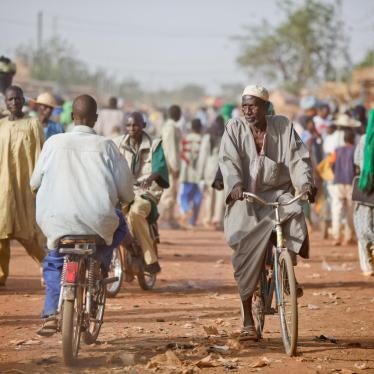Nearly a year ago, heads of state, regional leaders and international organizations met in Dakar to map strategies to confront terrorism in Africa. When participants regroup in Dakar on November 8-10, they would do well to take stock of how some of these counterterrorism initiatives have gone terribly awry.
At the first Dakar International Forum on Peace and Security, United Nations Security Council counterterrorism representatives urged African nations to criminalize participation in violent extremist groups at home and abroad. In the past year, nine African governments have passed one or more such measures. That brings to at least 23 the number of African countries, from Algeria to Zimbabwe, with sweeping counterterrorism laws on their books.
Governments have a responsibility to protect their people from harm, and there's no question that groups such as Boko Haram, Al-Shabab, and Al-Qaeda in the Islamic Maghreb are carrying out atrocities in Africa—which suffered the deadly attacks of August 7, 1998 in Nairobi and Dar Es Salaam three years before September 11. But instead of enacting clear, just and proportionate counterterrorism laws, many African governments have adopted measures that can potentially become instruments of repression. These measures are being used to stifle peaceful dissent, detain suspects for prolonged periods without charge, arbitrarily restrict freedom of movement, and sanction hasty executions following convictions in unfair trials.
Take for example Chad, which in August executed 10 men immediately after convicting them in a secret, two-day trial for deadly attacks in June and July claimed by Boko Haram. United Nations human rights officials have decried the severity, secrecy and haste of these actions. Chad charged and executed the men under its Repression of Terrorism Act, enacted one month earlier, which reinstated the death penalty with no rights of appeal. It was Chad's first use of the death penalty since 2003.
In Ethiopia, dozens of journalists, bloggers and political dissidents have been wrongfully charged or convicted under the 2009 Anti-Terrorism Proclamation. Some detainees charged under the counterterrorism law have alleged torture or other abuse. In one of the most prominent cases, the Federal High Court recently threw out the trumped-up charges against the group known as Zone 9 bloggers. Four of the defendants were finally released in October after 539 days of unlawful imprisonment. Just a few of those still held under the law include a former World Bank translator and two activists arrested in March for trying to attend a food security workshop in Nairobi.
In Cameroon, the government enacted its Law on the Fight Against Terrorism in December 2014, ostensibly to prosecute crimes by Boko Haram, but has also used it to break up meetings and detain members of the Southern Cameroons National Council, a minority separatist movement. The law's overly broad language also could be used to outlaw street protests and imprison journalists for years.
In Kenya, the high court in February struck down eight draconian provisions of the Security Laws (Amendments) Act, which the national parliament had passed two months earlier, as unconstitutional. That hasn't stopped the Kenyan authorities from repeatedly trying to shut down human rights organizations, claiming that they are supporting terrorism. In April two prominent rights groups documenting counterterrorism abuses by security forces on Kenya's coast were included on a list of alleged supporters of terrorism. A government-ordered freeze on both groups' bank accounts remains in place even though a court cleared the organizations of any terrorism links.
In some cases, governments don't even appear to seek legal cover when they violate rights in the name of countering terror. Examples documented by Human Rights Watch include the Kenyan and Nigerian security forces' patterns of extrajudicial killings, arbitrary detentions, and torture during their crackdowns on Al-Shabab and Boko Haram, respectively. Cameroon's security forces have carried out similar violations in their efforts to rout Boko Haram, Amnesty International reported. Regrettably, however, when governments do try to sanction unjust acts under the color of law, vaguely worded U.N. Security Council mandates at times provide a helping hand.
Security Council Resolution 2178 of September 2014, for example, requires all U.N. member countries to "establish serious criminal offenses" for citizens who travel or seek to travel abroad to become "foreign terrorist fighters." But the resolution does not define "terrorism" or "terrorist," terms for which no universal legal definition exists. This allows countries to slap these labels on domestic political opponents, peaceful protesters, or others practicing non-violent dissent.
Security Council counterterrorism representatives were heavily promoting Resolution 2178 at last year's Dakar Forum. This year, they should consider emphasizing a different point: that violating human rights ostensibly to make a country safer can backfire by cutting off peaceful avenues for democratic reform, angering marginalized populations and legitimizing support for extremist groups. It's a message that African leaders should take seriously as they gather in Dakar.








